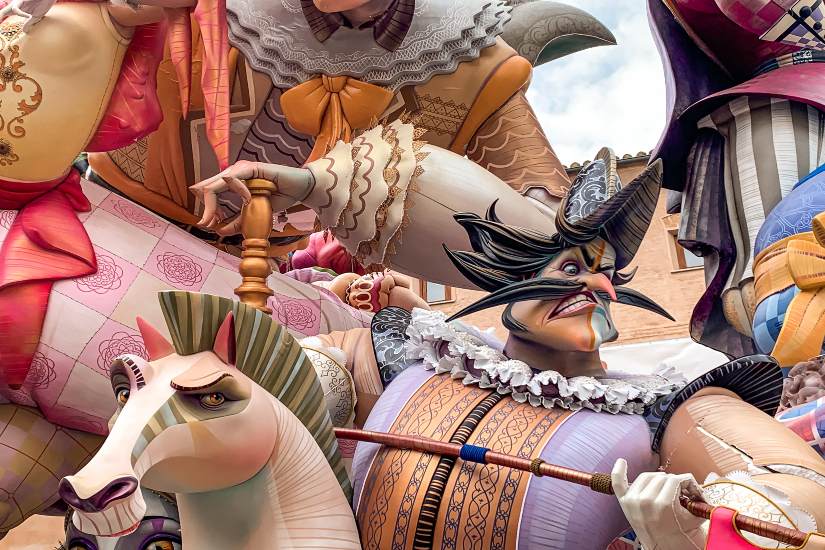We Spaniards love popular festivals: we like to get together with friends and family to enjoy ourselves, fill the streets with joy and passion and take care of our customs and traditions, and this is of great interest to foreign students who visit us to learn Spanish.
Dances and regional costumes, concerts, firecrackers, attractions, fairs… Some of Spain’s most important celebrations are internationally renowned and attract hundreds of tourists every year.
If you are considering studying our Spanish courses in Spain and want to experience, at least once in your life, some of the most original Spanish festivals, we recommend that you make a note of these festivities in your diary.
Festival Calendar in Spain
In Spain there are popular celebrations and festivals throughout the year.
From the Three Kings’ Cavalcades in January to Christmas in December, including Carnivals (February), Fallas (March), Easter Week (March-April), the pilgrimages in May, the Corpus Christi and San Juan celebrations (June), the Sanfermines (July), the popular festivals in August and September and the All Saints’ Day celebrations (November).
Top 3 Spanish festivals in Valencia
Here are some of the most original and eye-catching ones that you can discover while studying in Spain.
1.- Valencia’s Fallas (March)
Las Fallas is the crown jewel of Valencia’s festival calendar — a UNESCO-recognized cultural masterpiece. Celebrated every March in honor of Saint Joseph, Las Fallas transforms the entire city into a theatrical, noisy, and fiery wonderland.
More than 750 massive sculptures, called fallas, are erected across the city. These colorful, cartoon-like monuments are often satirical, poking fun at politicians, celebrities, or societal issues. Built from wood, cardboard, and papier-mâché, each falla can take an entire year to create — only to be burned to ashes in the grand finale.
Key moments of the festival include:
-
Mascletàs: Daily explosive firecracker shows at 2:00 PM in Plaza del Ayuntamiento. It’s not about visuals — it’s about the thunderous sound.
-
La Ofrenda de Flores: A two-day floral offering to the Virgen de los Desamparados. Thousands in traditional dress carry bouquets to build a giant floral statue.
-
La Nit del Foc (Night of Fire): The most impressive fireworks display, held on the night of March 18.
-
La Cremà (March 19): All the fallas are burned in huge bonfires across the city, closing the festival with both beauty and destruction.
Las Fallas is more than a festival — it’s an explosion of art, identity, and community spirit.
Discover our organized Valencia day trips.
2.- Tomatina de Buñol (August)
La Tomatina is held on the last Wednesday in August in the town of Buñol, located in the interior of the province of Valencia, about 40 minutes from the capital.
This curious festival is famous all over the world (it has been declared a festival of International Tourist Interest) and its most important event is a “pitched battle” in which hundreds of people throw tomatoes at each other (hence its name) in the town square and its surrounding streets.
Nowadays, access to La Tomatina is restricted, and a ticket is required to take part.
Get to know our post about how to study abroad in Spain.
3.- Feria de Julio (July)
The Feria de Julio, or July Fair, is one of Valencia’s oldest and most beloved traditions, dating back to 1871. Originally created to offer entertainment during the hot summer month of July, it has since evolved into a vibrant city-wide celebration. Throughout the month, Valencia fills with open-air concerts in the Turia River Gardens — many of them free — featuring local bands, international performers, and orchestras.
One of the festival’s most iconic events is the Batalla de Flores (Battle of Flowers), a colorful and fragrant parade where decorated floats travel down the Paseo de la Alameda while participants and spectators engage in a playful flower-throwing battle. In addition, street performances and fireworks light up the evenings, especially on weekends, making the city come alive with activity. The Feria de Julio offers a fantastic opportunity to enjoy authentic Valencian culture beyond the beaches, with a warm, festive, and family-friendly atmosphere.
Get immersed in the language and culture – Enjoy this festival while you are taking your summer Spanish courses in Valencia.
Enjoy the most important festivals in Spain while you study Spanish in Valencia
At Españolé you will find the best intensive Spanish courses in Valencia, Spain.
At our school we are committed to a 360º linguistic and cultural immersion for our students, who during their stay in our student accommodation in Valencia can enjoy the main celebrations of the city.
In addition, Valencia is one of the best communicated cities in Spain and you can travel to other parts of the country to enjoy its traditions and popular festivals.

